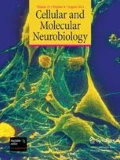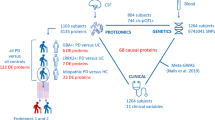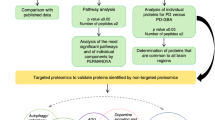Abstract
Parkinson’s disease (PD) is an age-related, threatening neurodegenerative disorder with no reliable treatment till date. Identification of specific and reliable biomarker is a major challenge for disease diagnosis and designing effective therapeutic strategy against it. PD pathology at molecular level involves abnormal expression and function of several proteins, including alpha-synuclein. These proteins affect the normal functioning of neurons through various post-translational modifications and interaction with other cellular components. The role of protein anomalies during PD pathogenesis can be better understood by the application of proteomics approach. A number of proteomic studies conducted on brain tissue, blood, and cerebrospinal fluid of PD patients have identified a wide array of protein alterations underlying disease pathogenesis. However, these studies are limited by the types of brain regions or biofluids utilized in the research. For a complete understanding of PD mechanism and discovery of reliable protein biomarkers, it is essential to analyze the proteome of different PD-associated brain regions and easily accessible biofluids such as saliva and urine. The present review summarizes the major advances in the field of PD research in humans utilizing proteomic techniques. Moreover, potential samples for proteomic analysis and limitations associated with the analyses of different types of samples have also been discussed.

Similar content being viewed by others
Abbreviations
- PD:
-
Parkinson’s disease
- UCHL1:
-
Ubiquitin carboxy-terminal hydrolase L1
- LRRK2:
-
Leucine-rich repeat kinase 2
- PINK1:
-
PTEN-induced kinase 1
- LNs:
-
Lewy neurites
- LBs:
-
Lewy bodies
- LC:
-
Locus coeruleus
- SN:
-
Substantia nigra
- Prx:
-
Peroxiredoxin
- CSF:
-
Cerebrospinal fluid
- GGH:
-
Gamma glutamyl hydrolase
- SOD:
-
Superoxide dismutase
- AD:
-
Alzheimer’s disease
- Apo:
-
Apolipoprotein
- TIMP1:
-
Metalloproteinase inhibitor 1
- APLP1:
-
Amyloid-like protein 1
- LRP1:
-
Prolow-density lipoprotein receptor-related protein 1
- CSF1R:
-
Macrophage colony-stimulating factor 1 receptor
- EPHA4:
-
Ephrin type-A receptor 4
- PRNP:
-
Major prion protein
- HSPG2:
-
Heparan sulfate proteoglycan 2
- MEGF8:
-
Multiple EGF-like domains 8
- NCAM1:
-
Neural cell adhesion molecule 1
- 2-DE:
-
Two-dimensional gel electrophoresis
- 2-D DIGE:
-
Two-dimensional difference gel electrophoresis
- MALDI-TOF/TOF-MS:
-
Matrix-assisted laser desorption/ionization time-of-flight mass spectrometry
- MALDI-IMS:
-
MALDI imaging mass spectrometry
- LC-ESI-MS/MS:
-
Liquid chromatography-electrospray ionization tandem mass spectrometry
- ESI-Q-TOF MS/MS:
-
Electrospray-quadrupole-time-of-flight tandem mass spectrometry
- ESI-MS:
-
Electrospray ionization mass spectrometry
References
Abdi F, Quinn JF, Jankovic J et al (2006) Detection of biomarkers with a multiplex quantitative proteomic platform in cerebrospinal fluid of patients with neurodegenerative disorders. J Alzheimers Dis JAD 9:293–348
Alberio T, Pippione AC, Comi C et al (2012) Dopaminergic therapies modulate the T-CELL proteome of patients with Parkinson’s disease. IUBMB Life 64:846–852. https://doi.org/10.1002/iub.1073
Alberio T, Bucci EM, Natale M et al (2013) Parkinson’s disease plasma biomarkers: an automated literature analysis followed by experimental validation. J Proteomics 90:107–114. https://doi.org/10.1016/j.jprot.2013.01.025
Anderson NL, Anderson NG (2002) The human plasma proteome: history, character, and diagnostic prospects. Mol Cell Proteomics MCP 1:845–867
Arduíno DM, Esteves AR, Cardoso SM, Oliveira CR (2009) Endoplasmic reticulum and mitochondria interplay mediates apoptotic cell death: relevance to Parkinson’s disease. Neurochem Int 55:341–348. https://doi.org/10.1016/j.neuint.2009.04.004
Bagheri H, Berlan M, Senard JM et al (1994) Lacrimation in Parkinson’s disease. Clin Neuropharmacol 17:89–91
Basso M, Giraudo S, Corpillo D et al (2004) Proteome analysis of human substantia nigra in Parkinson’s disease. Proteomics 4:3943–3952. https://doi.org/10.1002/pmic.200400848
Betzer C, Movius AJ, Shi M et al (2015) Identification of synaptosomal proteins binding to monomeric and oligomeric α-synuclein. PLoS ONE 10:e0116473. https://doi.org/10.1371/journal.pone.0116473
Boerger M, Funke S, Leha A et al (2019) Proteomic analysis of tear fluid reveals disease-specific patterns in patients with Parkinson’s disease—a pilot study. Parkinsonism Relat Disord. https://doi.org/10.1016/j.parkreldis.2019.03.001
Braak H, Del Tredici K, Rüb U et al (2003) Staging of brain pathology related to sporadic Parkinson’s disease. Neurobiol Aging 24:197–211
Braak H, Ghebremedhin E, Rüb U et al (2004) Stages in the development of Parkinson’s disease-related pathology. Cell Tissue Res 318:121–134. https://doi.org/10.1007/s00441-004-0956-9
Breen DP, Michell AW, Barker RA (2011) Parkinson’s disease—the continuing search for biomarkers. Clin Chem Lab Med 49:393–401. https://doi.org/10.1515/CCLM.2011.080
Buchberger AR, DeLaney K, Johnson J, Li L (2018) Mass spectrometry imaging: a review of emerging advancements and future insights. Anal Chem 90:240–265. https://doi.org/10.1021/acs.analchem.7b04733
Chaudhuri KR, Healy DG, Schapira AHV, National Institute for Clinical Excellence (2006) Non-motor symptoms of Parkinson’s disease: diagnosis and management. Lancet Neurol 5:235–245. https://doi.org/10.1016/S1474-4422(06)70373-8
Chen H, Yoshioka H, Kim GS et al (2011a) Oxidative stress in ischemic brain damage: mechanisms of cell death and potential molecular targets for neuroprotection. Antioxid Redox Signal 14:1505–1517. https://doi.org/10.1089/ars.2010.3576
Chen H-M, Lin C-Y, Wang V (2011b) Amyloid P component as a plasma marker for Parkinson’s disease identified by a proteomic approach. Clin Biochem 44:377–385. https://doi.org/10.1016/j.clinbiochem.2011.01.002
Choi J, Levey AI, Weintraub ST et al (2004) Oxidative modifications and down-regulation of ubiquitin carboxyl-terminal hydrolase L1 associated with idiopathic Parkinson’s and Alzheimer’s diseases. J Biol Chem 279:13256–13264. https://doi.org/10.1074/jbc.M314124200
Choi J, Rees HD, Weintraub ST et al (2005) Oxidative modifications and aggregation of Cu, Zn-superoxide dismutase associated with Alzheimer and Parkinson diseases. J Biol Chem 280:11648–11655. https://doi.org/10.1074/jbc.M414327200
Choi J, Sullards MC, Olzmann JA et al (2006) Oxidative damage of DJ-1 is linked to sporadic Parkinson and Alzheimer diseases. J Biol Chem 281:10816–10824. https://doi.org/10.1074/jbc.M509079200
Craft GE, Chen A, Nairn AC (2013) Recent advances in quantitative neuroproteomics. Methods San Diego Calif 61:186–218. https://doi.org/10.1016/j.ymeth.2013.04.008
Dauer W, Przedborski S (2003) Parkinson’s disease: mechanisms and models. Neuron 39:889–909
Del Tredici K, Hawkes CH, Ghebremedhin E, Braak H (2010) Lewy pathology in the submandibular gland of individuals with incidental Lewy body disease and sporadic Parkinson’s disease. Acta Neuropathol (Berl) 119:703–713. https://doi.org/10.1007/s00401-010-0665-2
Devic I, Hwang H, Edgar JS et al (2011) Salivary α-synuclein and DJ-1: potential biomarkers for Parkinson’s disease. Brain 134:e178–e178. https://doi.org/10.1093/brain/awr015
Dixit A, Srivastava G, Verma D et al (2013) Minocycline, levodopa and MnTMPyP induced changes in the mitochondrial proteome profile of MPTP and maneb and paraquat mice models of Parkinson’s disease. Biochim Biophys Acta BBA Mol Basis Dis 1832:1227–1240. https://doi.org/10.1016/j.bbadis.2013.03.019
Domingues AF, Arduíno DM, Esteves AR et al (2008) Mitochondria and ubiquitin-proteasomal system interplay: relevance to Parkinson’s disease. Free Radic Biol Med 45:820–825. https://doi.org/10.1016/j.freeradbiomed.2008.06.007
Doty RL (2012) Olfactory dysfunction in Parkinson disease. Nat Rev Neurol 8:329–339. https://doi.org/10.1038/nrneurol.2012.80
Double KL, Ben-Shachar D, Youdim MBH et al (2002) Influence of neuromelanin on oxidative pathways within the human substantia nigra. Neurotoxicol Teratol 24:621–628
Dumitriu A, Golji J, Labadorf AT et al (2016) Integrative analyses of proteomics and RNA transcriptomics implicate mitochondrial processes, protein folding pathways and GWAS loci in Parkinson disease. BMC Med Genomics 9:5. https://doi.org/10.1186/s12920-016-0164-y
Dutta D, Ali N, Banerjee E et al (2018) Low levels of prohibitin in substantia nigra makes dopaminergic neurons vulnerable in Parkinson’s disease. Mol Neurobiol 55:804–821. https://doi.org/10.1007/s12035-016-0328-y
Edwards LL, Pfeiffer RF, Quigley EM et al (1991) Gastrointestinal symptoms in Parkinson’s disease. Mov Disord Off J Mov Disord Soc 6:151–156. https://doi.org/10.1002/mds.870060211
Ferrer I (2009) Early involvement of the cerebral cortex in Parkinson’s disease: convergence of multiple metabolic defects. Prog Neurobiol 88:89–103. https://doi.org/10.1016/j.pneurobio.2009.02.004
Finehout EJ, Franck Z, Lee KH (2005) Complement protein isoforms in CSF as possible biomarkers for neurodegenerative disease. Dis Markers 21:93–101
Fraser KB, Moehle MS, Alcalay RN, West AB (2016) Urinary LRRK2 phosphorylation predicts parkinsonian phenotypes in G2019S LRRK2 carriers. Neurology 86:994–999. https://doi.org/10.1212/WNL.0000000000002436
Gasser T (2007) Update on the genetics of Parkinson’s disease. Mov Disord Off J Mov Disord Soc 22(Suppl 17):S343–350. https://doi.org/10.1002/mds.21676
Goldknopf IL, Bryson JK, Strelets I et al (2009) Abnormal serum concentrations of proteins in Parkinson’s disease. Biochem Biophys Res Commun 389:321–327. https://doi.org/10.1016/j.bbrc.2009.08.150
Gómez A, Ferrer I (2009) Increased oxidation of certain glycolysis and energy metabolism enzymes in the frontal cortex in Lewy body diseases. J Neurosci Res 87:1002–1013. https://doi.org/10.1002/jnr.21904
Guo J, Sun Z, Xiao S et al (2009) Proteomic analysis of the cerebrospinal fluid of Parkinson’s disease patients. Cell Res 19:1401–1403. https://doi.org/10.1038/cr.2009.131
Haas BR, Stewart TH, Zhang J (2012) Premotor biomarkers for Parkinson’s disease—a promising direction of research. Transl Neurodegener 1:11. https://doi.org/10.1186/2047-9158-1-11
Ho DH, Yi S, Seo H, et al (2014) Increased DJ-1 in urine exosome of Korean males with Parkinson’s disease. BioMed Res Int. https://www.hindawi.com/journals/bmri/2014/704678/. Accessed 8 Oct 2018
Hong Z, Shi M, Chung KA et al (2010) DJ-1 and α-synuclein in human cerebrospinal fluid as biomarkers of Parkinson’s disease. Brain 133:713–726. https://doi.org/10.1093/brain/awq008
Hurley MJ, Mash DC, Jenner P (2003) Markers for dopaminergic neurotransmission in the cerebellum in normal individuals and patients with Parkinson’s disease examined by RT-PCR. Eur J Neurosci 18:2668–2672
Ihara Y, Chuda M, Kuroda S, Hayabara T (1999) Hydroxyl radical and superoxide dismutase in blood of patients with Parkinson’s disease: relationship to clinical data. J Neurol Sci 170:90–95
Jin J, Meredith GE, Chen L et al (2005) Quantitative proteomic analysis of mitochondrial proteins: relevance to Lewy body formation and Parkinson’s disease. Brain Res Mol Brain Res 134:119–138. https://doi.org/10.1016/j.molbrainres.2004.10.003
Jin J, Hulette C, Wang Y et al (2006) Proteomic identification of a stress protein, mortalin/mthsp70/GRP75: relevance to Parkinson disease. Mol Cell Proteomics 5:1193–1204. https://doi.org/10.1074/mcp.M500382-MCP200
Kasap M, Akpinar G, Kanli A (2017) Proteomic studies associated with Parkinson’s disease. Expert Rev Proteomics 14:193–209. https://doi.org/10.1080/14789450.2017.1291344
Kitamura Y, Kojima M, Kurosawa T et al (2018) Proteomic profiling of exosomal proteins for blood-based biomarkers in Parkinson’s disease. Neuroscience 392:121–128. https://doi.org/10.1016/j.neuroscience.2018.09.017
Kitsou E, Pan S, Zhang J et al (2008) Identification of proteins in human substantia nigra. Proteomics Appl 2:776–782. https://doi.org/10.1002/prca.200800028
Krapfenbauer K, Engidawork E, Cairns N et al (2003) Aberrant expression of peroxiredoxin subtypes in neurodegenerative disorders. Brain Res 967:152–160
Lachén-Montes M, González-Morales A, Iloro I et al (2019) Unveiling the olfactory proteostatic disarrangement in Parkinson’s disease by proteome-wide profiling. Neurobiol Aging 73:123–134. https://doi.org/10.1016/j.neurobiolaging.2018.09.018
Leverenz JB, Umar I, Wang Q et al (2007) Proteomic identification of novel proteins in cortical lewy bodies. Brain Pathol Zur Switz 17:139–145. https://doi.org/10.1111/j.1750-3639.2007.00048.x
Licker V, Burkhard PR (2014) Proteomics as a new paradigm to tackle Parkinson’s disease research challenges. Transl Proteomics 4–5:1–17. https://doi.org/10.1016/j.trprot.2014.08.001
Licker V, Kövari E, Hochstrasser DF, Burkhard PR (2009) Proteomics in human Parkinson’s disease research. J Proteomics 73:10–29. https://doi.org/10.1016/j.jprot.2009.07.007
Licker V, Côte M, Lobrinus JA et al (2012) Proteomic profiling of the substantia nigra demonstrates CNDP2 overexpression in Parkinson’s disease. J Proteomics 75:4656–4667. https://doi.org/10.1016/j.jprot.2012.02.032
Licker V, Turck N, Kövari E et al (2014) Proteomic analysis of human substantia nigra identifies novel candidates involved in Parkinson’s disease pathogenesis. Proteomics 14:784–794. https://doi.org/10.1002/pmic.201300342
Lu W, Wan X, Liu B et al (2014) Specific changes of serum proteins in Parkinson’s disease patients. PLoS ONE 9:e95684. https://doi.org/10.1371/journal.pone.0095684
Magdalinou NK, Noyce AJ, Pinto R et al (2017) Identification of candidate cerebrospinal fluid biomarkers in Parkinsonism using quantitative proteomics. Parkinsonism Relat Disord 37:65–71. https://doi.org/10.1016/j.parkreldis.2017.01.016
Masters JM, Noyce AJ, Warner TT et al (2015) Elevated salivary protein in Parkinson’s disease and salivary DJ-1 as a potential marker of disease severity. Parkinsonism Relat Disord 21:1251–1255. https://doi.org/10.1016/j.parkreldis.2015.07.021
Mila S, Albo AG, Corpillo D et al (2009) Lymphocyte proteomics of Parkinson’s disease patients reveals cytoskeletal protein dysregulation and oxidative stress. Biomark Med 3:117–128. https://doi.org/10.2217/bmm.09.4
Nicotra A, Parvez S (2002) Apoptotic molecules and MPTP-induced cell death. Neurotoxicol Teratol 24:599–605
Olanow CW, McNaught K (2011) Parkinson’s disease, proteins, and prions: milestones. Mov Disord Off J Mov Disord Soc 26:1056–1071. https://doi.org/10.1002/mds.23767
Olivieri S, Conti A, Iannaccone S et al (2011) Ceruloplasmin oxidation, a feature of Parkinson’s disease CSF, inhibits ferroxidase activity and promotes cellular iron retention. J Neurosci 31:18568–18577. https://doi.org/10.1523/JNEUROSCI.3768-11.2011
Pan S, Rush J, Peskind ER et al (2008) Application of targeted quantitative proteomics analysis in human cerebrospinal fluid using a liquid chromatography matrix-assisted laser desorption/ionization time-of-flight tandem mass spectrometer (LC MALDI TOF/TOF) platform. J Proteome Res 7:720–730. https://doi.org/10.1021/pr700630x
Pan C, Zhou Y, Dator R et al (2014) Targeted discovery and validation of plasma biomarkers of Parkinson’s disease. J Proteome Res 13:4535–4545. https://doi.org/10.1021/pr500421v
Parker WD, Boyson SJ, Parks JK (1989) Abnormalities of the electron transport chain in idiopathic Parkinson’s disease. Ann Neurol 26:719–723. https://doi.org/10.1002/ana.410260606
Payoux P, Remy P, Damier P et al (2004) Subthalamic nucleus stimulation reduces abnormal motor cortical overactivity in Parkinson disease. Arch Neurol 61:1307–1313. https://doi.org/10.1001/archneur.61.8.1307
Pienaar IS, Daniels WMU, Götz J (2008) Neuroproteomics as a promising tool in Parkinson’s disease research. J Neural Transm Vienna Austria 1996 115:1413–1430. https://doi.org/10.1007/s00702-008-0070-3
Pienaar IS, Dexter DT, Burkhard PR (2010) Mitochondrial proteomics as a selective tool for unraveling Parkinson’s disease pathogenesis. Expert Rev Proteomics 7:205–226. https://doi.org/10.1586/epr.10.8
Ping L, Duong DM, Yin L et al (2018) Global quantitative analysis of the human brain proteome in Alzheimer’s and Parkinson’s disease. Sci Data 5:180036. https://doi.org/10.1038/sdata.2018.36
Plum S, Steinbach S, Attems J et al (2016) Proteomic characterization of neuromelanin granules isolated from human substantia nigra by laser-microdissection. Sci Rep. https://doi.org/10.1038/srep37139
Prakash K, Bannur B, Chavan M et al (2016) Neuroanatomical changes in Parkinson′s disease in relation to cognition: an update. J Adv Pharm Technol Res 7:123. https://doi.org/10.4103/2231-4040.191416
Rabouille C, Haase G (2015) Editorial: Golgi pathology in neurodegenerative diseases. Front Neurosci 9:489. https://doi.org/10.3389/fnins.2015.00489
Ray S, Reddy PJ, Jain R et al (2011) Proteomic technologies for the identification of disease biomarkers in serum: advances and challenges ahead. Proteomics 11:2139–2161. https://doi.org/10.1002/pmic.201000460
Romeo MJ, Espina V, Lowenthal M et al (2005) CSF proteome: a protein repository for potential biomarker identification. Expert Rev Proteomics 2:57–70. https://doi.org/10.1586/14789450.2.1.57
Ruan Q, Harrington AJ, Caldwell KA et al (2010) VPS41, a protein involved in lysosomal trafficking, is protective in Caenorhabditis elegans and mammalian cellular models of Parkinson’s disease. Neurobiol Dis 37:330–338. https://doi.org/10.1016/j.nbd.2009.10.011
Sato S, Mizuno Y, Hattori N (2005) Urinary 8-hydroxydeoxyguanosine levels as a biomarker for progression of Parkinson disease. Neurology 64:1081–1083. https://doi.org/10.1212/01.WNL.0000154597.24838.6B
Shi M, Caudle WM, Zhang J (2009) Biomarker discovery in neurodegenerative diseases: a proteomic approach. Neurobiol Dis 35:157–164. https://doi.org/10.1016/j.nbd.2008.09.004
Shi M, Movius J, Dator R et al (2015) Cerebrospinal fluid peptides as potential Parkinson disease biomarkers: a staged pipeline for discovery and validation. Mol Cell Proteomics MCP 14:544–555. https://doi.org/10.1074/mcp.M114.040576
Sinha A, Patel S, Singh MP, Shukla R (2007) Blood proteome profiling in case controls and Parkinson’s disease patients in Indian population. Clin Chim Acta Int J Clin Chem 380:232–234. https://doi.org/10.1016/j.cca.2007.02.013
Sinha A, Srivastava N, Singh S et al (2009) Identification of differentially displayed proteins in cerebrospinal fluid of Parkinson’s disease patients: a proteomic approach. Clin Chim Acta Int J Clin Chem 400:14–20. https://doi.org/10.1016/j.cca.2008.09.026
Slodzinski H, Moran LB, Michael GJ et al (2009) Homocysteine-induced endoplasmic reticulum protein (herp) is up-regulated in parkinsonian substantia nigra and present in the core of Lewy bodies. Clin Neuropathol 28:333–343
Thongboonkerd V (2007) Practical points in urinary proteomics. J Proteome Res 6:3881–3890. https://doi.org/10.1021/pr070328s
Tribl F, Gerlach M, Marcus K et al (2005) “Subcellular proteomics” of neuromelanin granules isolated from the human brain. Mol Cell Proteomics MCP 4:945–957. https://doi.org/10.1074/mcp.M400117-MCP200
Tribl F, Marcus K, Bringmann G et al (2006) Proteomics of the human brain: sub-proteomes might hold the key to handle brain complexity. J Neural Transm Vienna Austria 1996 113:1041–1054. https://doi.org/10.1007/s00702-006-0513-7
Tribl F, Asan E, Arzberger T et al (2009) Identification of L-ferritin in neuromelanin granules of the human substantia nigra: a targeted proteomics approach. Mol Cell Proteomics MCP 8:1832–1838. https://doi.org/10.1074/mcp.M900006-MCP200
van Dijk KD, Teunissen CE, Drukarch B et al (2010) Diagnostic cerebrospinal fluid biomarkers for Parkinson’s disease: a pathogenetically based approach. Neurobiol Dis 39:229–241. https://doi.org/10.1016/j.nbd.2010.04.020
van Dijk KD, Berendse HW, Drukarch B et al (2012) The proteome of the locus ceruleus in Parkinson’s disease: relevance to pathogenesis: locus ceruleus proteomics in Parkinson’s disease. Brain Pathol 22:485–498. https://doi.org/10.1111/j.1750-3639.2011.00540.x
Veenstra TD, Conrads TP, Hood BL et al (2005) Biomarkers: mining the biofluid proteome. Mol Cell Proteomics MCP 4:409–418. https://doi.org/10.1074/mcp.M500006-MCP200
Ward M, Güntert A, Campbell J, Pike I (2009) Proteomics for brain disorders—the promise for biomarkers. Ann N Y Acad Sci 1180:68–74. https://doi.org/10.1111/j.1749-6632.2009.05018.x
Waybright TJ (2013) Preparation of human cerebrospinal fluid for proteomics biomarker analysis. Methods Mol Biol Clifton NJ 1002:61–70. https://doi.org/10.1007/978-1-62703-360-2_5
Werner CJ, Heyny-von Haussen R, Mall G, Wolf S (2008) Proteome analysis of human substantia nigra in Parkinson’s disease. Proteome Sci 6:8. https://doi.org/10.1186/1477-5956-6-8
Wu T, Hallett M (2013) The cerebellum in Parkinson’s disease. Brain 136:696–709. https://doi.org/10.1093/brain/aws360
Xia Q, Liao L, Cheng D et al (2008) Proteomic identification of novel proteins associated with Lewy bodies. Front Biosci J Virtual Libr 13:3850–3856
Yadav S, Dixit A, Agrawal S et al (2012) Rodent models and contemporary molecular techniques: notable feats yet incomplete explanations of Parkinson’s disease pathogenesis. Mol Neurobiol 46:495–512. https://doi.org/10.1007/s12035-012-8291-8
Yin GN, Lee HW, Cho J-Y, Suk K (2009) Neuronal pentraxin receptor in cerebrospinal fluid as a potential biomarker for neurodegenerative diseases. Brain Res 1265:158–170. https://doi.org/10.1016/j.brainres.2009.01.058
Yin L, Zhang Z, Liu Y et al (2019) Recent advances in single-cell analysis by mass spectrometry. The Anal 144:824–845. https://doi.org/10.1039/C8AN01190G
Zhang J, Sokal I, Peskind ER et al (2008a) CSF multianalyte profile distinguishes Alzheimer and Parkinson diseases. Am J Clin Pathol 129:526–529. https://doi.org/10.1309/W01Y0B808EMEH12L
Zhang J, Sokal I, Peskind ER et al (2008b) CSF multianalyte profile distinguishes Alzheimer and Parkinson diseases. Am J Clin Pathol 129:526–529. https://doi.org/10.1309/W01Y0B808EMEH12L
Zhao X, Xiao WZ, Pu XP, Zhong LJ (2010) Proteome analysis of the sera from Chinese Parkinson’s disease patients. Neurosci Lett 479:175–179. https://doi.org/10.1016/j.neulet.2010.05.063
Acknowledgements
Dr. M. P. Singh and CSIR-Indian Institute of Toxicology Research, Lucknow, India are acknowledged for providing guidance and research facilities to AD.
Author information
Authors and Affiliations
Contributions
AD-Review design, literature collection, data interpretation, and manuscript preparation. RM-Review design and manuscript preparation. AKS-Review design and manuscript preparation.
Corresponding author
Ethics declarations
Conflict of interest
The authors declare that they do not have any conflict of interest.
Ethical Approval
All reported studies involving human participants/animals have been previously published and procedures performed in studies were in accordance with applicable ethical standards of the institution and/or national research committee, international, national, and/or institutional guidelines, and 1964 Helsinki Declaration and its later amendments or comparable ethical standards.
Informed Consent
Informed consent was obtained from all individual participants included in the reported studies.
Additional information
Publisher's Note
Springer Nature remains neutral with regard to jurisdictional claims in published maps and institutional affiliations.
Rights and permissions
About this article
Cite this article
Dixit, A., Mehta, R. & Singh, A.K. Proteomics in Human Parkinson’s Disease: Present Scenario and Future Directions. Cell Mol Neurobiol 39, 901–915 (2019). https://doi.org/10.1007/s10571-019-00700-9
Received:
Accepted:
Published:
Issue Date:
DOI: https://doi.org/10.1007/s10571-019-00700-9




